

When I reflect on the Library’s work in 2019–2020, I recognize that much of our success boils down to having built positive and productive relationships with colleagues and clients. In the same fiscal year where we welcomed 98 new parliamentarians following the October 2019 general election, the Library also faced an unprecedented shift in how we do business due to the COVID‑19 pandemic. Our strong culture of continually listening, learning and improving meant that the Library was more than ready for the year’s challenges. We saw them as an opportunity to adapt and excel.
Nowhere was our commitment to relationships and connection with our clients more apparent than in our work preparing for the 43rd Parliament and orienting parliamentarians. You will read later in this report about the many products and services we delivered as parliamentarians settled into their new roles, including seminars about our services, special tours of the Senate of Canada Building and West Block, and analyses of key issues. But the most important orientation initiative was our renewed and expanded Ambassador Program.
During the 2019–2020 fiscal year, 67 Library employees served as ambassadors to assist parliamentarians and their staff as they learned about our products and services – more than double the number of volunteers recruited for the last Parliament. Rather than offering a single briefing to each parliamentary office as our ambassadors have done in the past, they committed this time to building ongoing connections with parliamentarians’ offices, recognizing that staff changes and the Library’s services evolve. By maintaining close connections with our clients, we improve our capacity to serve.
Open communication helped us improve a number of other services in the 2019–2020 fiscal year. For instance, our employees worked hard to adjust to the closure of Centre Block for its rehabilitation. As we fine-tuned our guided tours and introduced our suite of services at new locations, we received a continual stream of feedback from parliamentarians and the public. We leveraged that feedback to improve.
In addition to managing the major transitions we expected in 2019–2020, we were also prepared with the skills, knowledge and technology we needed to respond to unexpected developments. This served us well when March 2020 brought the unprecedented challenges of the COVID‑19 pandemic and lockdown that tested the Library’s agility under pressure. I am extremely proud of what the last two weeks of March revealed about our ability to pivot. Within days we shifted from being an organization that did business entirely on site to supporting all our clients remotely. We were able to accomplish this because we had the foundational strength to deliver remotely on nearly all of our core services for parliamentarians, even though we could not see them face to face. We were ready because we have been working steadily over many years to adopt technologies that give our employees tools to work remotely and the ability to connect with parliamentarians wherever they are working.
We were quickly able to create valuable new products. Within days of the pandemic lockdown, we developed a timely, relevant and authoritative new HillNotes series on COVID‑19–related topics. We accomplished this the way we undertake all our major work at the Library: by getting input on what our clients need and then meeting those needs. The series has garnered much positive attention in Canada and around the world.
We were also ready to serve the public. In addition to continuing service through our public information line, we completed Parliament: The Virtual Experience just as the pandemic lockdown began. Our ambitious collaboration with the National Film Board of Canada created two distinct productions in virtual reality and online that provide experiences and sweeping views of Centre Block, both of which are accessible to homes across the country. These innovative products – combined with high‑definition video tours of the Senate of Canada Building and West Block that we launched earlier in the year – will remain available throughout the pandemic, however long it should last, and indefinitely beyond that.
Throughout an unusual and demanding year, we worked hard to help our employees function at their very best. We moved forward with the Library’s Healthy Workplace Strategy, which focuses on fostering an inclusive and respectful professional environment. Initiatives included incorporating inclusive language and Indigenous perspectives into more of our products, learning how to better deliver Gender‑Based Analysis Plus (GBA+) products and services to parliamentarians, and taking steps to create a barrier‑free workplace. We finalized a new Duty to Accommodate Policy in early 2020 and improved the accessibility of online products in alignment with the Accessible Canada Act recently passed by Parliament. Issues of accessibility and equity have always been very much on the Library’s agenda, and I’m pleased to report that we will continue to expand our efforts in 2021.
The Library’s strategic priorities for 2017–2022 are to be a relevant and agile organization, and to nurture a healthy workplace for employees. We have remained committed to these priorities since I took over as Parliamentary Librarian, and we continue to focus on nurturing the positive relationships with colleagues and clients that are critical to providing the best possible products and services to parliamentarians and the Canadian public. Our priorities have proven to be the ideal foundation for success through the pandemic and, I am confident, well into the future.
Dr. Heather Lank
Parliamentary Librarian
in-person visits to Library branches
e-journals available to Library users
inquiries about Parliament from the public
requests for research and analysis from parliamentarians and their staff
users helped through the Canadian Parliamentary Historical Resources portal and Parlinfo
requests for information and reference services from parliamentarians and their staff
comparative analysis requests from European parliaments
page views of the Our Country, Our Parliament and How Canadians Govern Themselves educational web resources
The Library’s strategic priorities have kept us optimally positioned to handle the unexpected. We are committed to staying relevant and agile, and to providing a healthy workplace where our employees can bring their best to the job. This has created an organization poised to overcome challenges.
In the 2019–2020 fiscal year, we showed our commitment to staying relevant by delivering a timely and focused orientation program for the 43rd Parliament, and by renewing and expanding our Ambassador Program. We demonstrated agility in moving to remote work during the first weeks of the COVID‑19 pandemic and by producing a timely series of research publications about the pandemic. Our determination to nurture a healthy workplace was evident in the implementation of our Healthy Workplace Strategy, which produced positive outcomes, and in our work to promote diversity and inclusion in the products and services we deliver.
Throughout the fiscal year, the Library and its clients reaped the benefits of the Library’s strong foundation for success.
In October 2019, the Library welcomed a new Parliament that included 98 newly elected members of the House of Commons. New parliamentarians are inundated with information, and the Library is committed to offering parliamentarians carefully curated information about our products and services early in their mandate so that we can be as helpful to them as possible. Our orientation program began with a series of targeted communication products, followed by a renewed Ambassador Program aimed at building close connections with parliamentary offices.
The Library planned its orientation program throughout 2019 to prepare for the arrival in October of the 43rd Parliament. We are confident that the program did a thorough job of informing parliamentarians about our services as nearly 90% of parliamentary offices requested the Library’s reference or research services following the election.
Throughout the orientation, we worked closely with the House of Commons Administration to ensure our activities were timely and well coordinated with theirs. Among our many goals was to welcome parliamentarians with appropriate information and support without overwhelming them.
The morning after the election, we posted the results to Parlinfo with profiles of each elected candidate. Over the following weeks, we provided a steady stream of orientation products and services, including:
Parliamentarians often find information about the Library through our intranet. To make sure we reached as many individuals as possible, this fiscal year we updated our intranet pages with easy‑to‑access information about our services, amenities and locations. Highlights included:
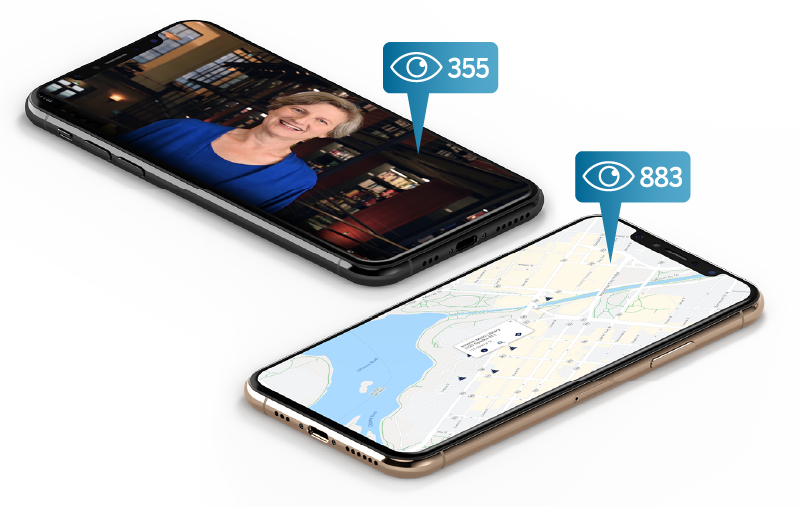
The Library delivered a proactive program of research products for parliamentarians as we welcomed the 43rd Parliament, including over 100 Working Papers and more than 35 research publications. Specifically, we created and published:
Research documents that support parliamentarians as they serve on committees, participate in parliamentary association activities and develop private members’ bills
Concise overviews of current and emerging issues of immediate interest to parliamentarians
In‑depth studies on policy issues, as well as short reports on current topics with links to more substantive sources on the same topic
A selection of publications that provide parliamentarians and their staff with essential information on how the Canadian parliamentary system works
The Library strives to ensure that parliamentarians and others who use our products find them to be not only useful, but also visually pleasing and easily recognizable. We refreshed our visual identity in 2019–2020 in a way that captures the dignity of the Library while projecting the character of a modern, professional and knowledge-based organization.
We used our new look in all our new printed and online products. These included our website, a series of information cards, contact cards with maps, newsletters and information sheets about the research support we provide for parliamentarians.
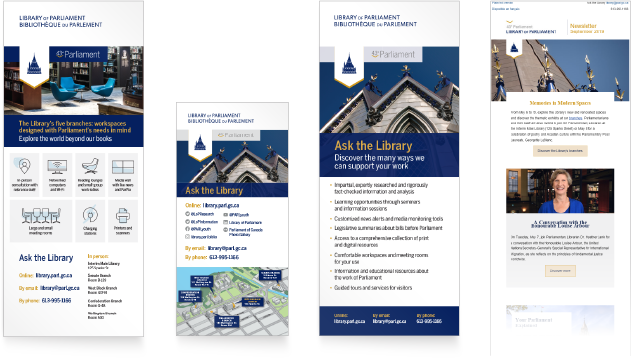


Our Ambassador Program is a key way for the Library to introduce senators, members of the House of Commons and their staff to our products and services. The ambassadors’ job is to meet with parliamentarians and their staff, hear from them and respond to their needs – then return as required to keep the connection going.
In 2019–2020, we revitalized our Ambassador Program significantly. First, 67 employees volunteered to train as ambassadors – more than double the number for the previous Parliament. Second, we shifted from a single briefing session to an approach designed to build lasting relationships. We asked our new ambassadors to commit to maintaining contact with parliamentarians throughout the life of the 43rd Parliament as Library services evolve and parliamentary staff changes.
In the initial phase of orientation, Library ambassadors reached out to parliamentary offices, and the Library provided comprehensive information on the web about the program and how to book an ambassador visit. Although the COVID‑19 lockdown interrupted some aspects of the Library’s services in this area, we resumed the program in May 2020 with calls to keep in touch and offered virtual briefings for parliamentarians and their staff.
Here is what our ambassadors achieved in the first few months of the 43rd Parliament:
In 2018–2019, the Library designed new guided tours for visitors to the Senate of Canada Building and West Block to accommodate the multi-year renovation of Parliament’s Centre Block. In 2019–2020, we continued to work closely with the Senate, House of Commons and Parliamentary Protective Service to ensure the public can enjoy the best that Parliament has to offer.
Guided tours: Until guided tours were suspended in March 2020 due to the pandemic, we continued to offer two new tours for visitors that had launched in February 2019: one of the Senate, now housed in the Senate of Canada Building, and the other of the House of Commons, now housed in West Block. The tours highlight the importance of Parliament, the Canadian parliamentary process, the work of senators and members of the House of Commons, and the history and architecture of the buildings. A survey held in the summer of 2019 told us that visitors to the Senate of Canada Building and West Block were highly satisfied with their guided tours, with 98% saying they would either take another tour or recommend one to friends and family.

Virtual experience: Parliament: The Virtual Experience is a multi-platform initiative that enables Canadians and visitors from around the world to connect virtually with Centre Block while it is closed for rehabilitation. In 2019–2020, the Library completed nearly all of the first phase of this project, including:

Along with these components, the Library developed many resources to support virtual learning, such as web pages, videos, lesson plans and other classroom resources. Planning and building fit‑up work for a new on‑site visitor destination began in 2019, and we expect it to open in 2021. This experience, which we are designing as a flagship attraction, will showcase the heritage, art and architecture of Centre Block through the use of immersive technologies.
Parliamentary Boutique: A few months after moving into the new boutique, the retail team created the Gallery Wall, which features works of art for sale created by local artists and photographers, with a particular focus on the buildings of Parliament Hill.
Planning for the future: Following the closure of Centre Block in 2018–2019, work is underway to prepare for an enhanced visitor experience when this iconic building reopens. The next phase of the Parliament Welcome Centre will give Canadians new ways to connect with Parliament beyond guided tours. Construction of the centre has begun while we continue to work with the Senate, the House of Commons, the Parliamentary Protective Service and Public Services and Procurement Canada on our long‑term vision for ensuring a positive visitor experience.
The Library places a high priority on recruiting the best possible talent to serve the needs of parliamentarians and the public. We also focus on nurturing talent by providing targeted training to our employees in areas such as Gender‑Based Analysis Plus (GBA+). These efforts allow us to better serve parliamentarians by promoting diversity and inclusion in all that we do, and by continuing to create a healthy, productive workplace.
GBA+ recognizes that everyone has multiple intersecting identity factors (for example, race, gender, age and education). GBA+ assesses how diverse groups of women, men and people with other gender identities experience programs, policies and initiatives. Parliamentarians have told the Library that GBA+ is a priority for them. During the fiscal year, we continued to improve our understanding and capacity in this key area of diversity and inclusion by:

In 2019–2020, the Library continued to implement its new Diversity and Inclusion Policy. The policy is the result of extensive research into best practices, consultation with our unions and careful analysis of the new Accessible Canada Act. Here are the highlights of our work in support of building greater diversity and inclusion at the Library:
The objective of the new Accessible Canada Act is to support the full and equal participation of all individuals in society by identifying, removing and preventing barriers. It provides for the development of accessibility standards. It also gives the federal government the authority to create new accessibility regulations that will apply to sectors within the federal jurisdiction, including parliamentary institutions.
Accessibility is key to so much of what we do; it needs to be incorporated into the design and delivery of our products, programs and services. Accessibility affects our own working environment, along with client and visitor spaces. We will continue to develop strategies to ensure a barrier‑free workplace and products and services that are accessible to all Canadians.
As a first step toward raising awareness about this issue, our executives met with the federal government lead for accessibility. This has initiated discussions about how the Library can better honour its commitment to accessibility.
In parallel, the Library improved some of its online products, including preliminary versions of Legislative Summaries, to ensure they meet international accessibility standards for online information. To support parliamentarians, we developed tools such as tip sheets on how to prepare accessible PDF documents and alternative text. We also increased our capacity to perform accessibility audits for new or updated web pages and websites.

The Library is proud to report continued success with our Healthy Workplace Strategy, which promotes a safe and healthy work environment for all our employees.
Since 2017, the Library has placed great importance on mental and psychological wellness for employees. We poll them every year on 13 psychosocial factors that contribute to a healthy workplace, including workload management, engagement and psychological support. Our third healthy workplace survey showed positive results, with no areas of significant concern. Throughout the fiscal year, we used awareness activities and training – including mindfulness training – to help improve and broaden our employees’ skill sets.
Library employees told us they feel connected to their work and are motivated. They demonstrated this by continuing to show a high level of interest in our many initiatives for creating a healthy workplace. One key activity was our continuing work toward ensuring everyone is safe on the job. During the fiscal year, the Library became subject to Part II of the Canada Labour Code – the section that covers occupational health and safety (OHS) – and many of our activities focused on complying with these new statutory requirements. We set up two OHS committees, began to update our OHS practices and procedures, and mandated that all employees receive health and safety training. By the end of March 2020, 75% of employees had completed the training.

The Library’s strategic priorities gave us the firm foundation we needed to respond effectively to the COVID‑19 pandemic. In the final weeks of March, which marked the end of our fiscal year, we continued to provide support to parliamentarians, staff and the public while protecting the health and safety of employees. As part of the Library's response in the early days of the pandemic, we:
The Library provides a wide range of services to meet the needs of parliamentarians and all our clients. To improve what we offer, we continuously seek client feedback and respond as needed.
In 2019–2020, the Library saw strong demand for its services, especially while Parliament was in session. Although there were no sittings of Parliament between June 21 and December 5, 2019 because of the election, this period enabled the Library to shift focus as we prepared products and services for the new Parliament.
| User Group | Information and Reference1 | Research and Analysis2 |
|---|---|---|
| Parliamentarians and their staff (including constituency staff) | 8,762 | 893 |
| Senators | 1,997 | 298 |
| Members of the House of Commons | 6,765 | 595 |
| Parliamentary committees, associations and delegations | 203 | 1,591 |
| Senate committees | 18 | 202 |
| House of Commons committees | 38 | 602 |
| Associations and delegations | 147 | 787 |
| Employees of the Senate, the House of Commons and the Library of Parliament | 3,441 | n/a |
| General public | 22,229 | n/a |
| Other authorized users3 | 3,347 | 16 |
| Total | 37,982 | 2,500 |


The Library created a working group on client experience and feedback in 2019 with a mandate to continuously improve the Library’s products, services and spaces based on feedback from parliamentarians, their staff, other authorized clients and the public. Guided by a strong vision and set of principles, the working group provided strategic advice on initiatives and activities aimed at improving:
The members of the working group also received training on the best techniques for conducting surveys and collecting the feedback we need to improve the client experience.
The Library is equally focused on improving the user experience (UX) across all our products and services. During this fiscal year, the Library trained staff in UX methods and best practices, and worked on a number of UX‑based projects, such as the reconfiguration of branch spaces.
The Library’s research librarians, information and research technicians, and current awareness technicians help parliamentarians and their staff by answering their questions on many topics. They curate news and other information and perform custom information searches and fact‑checking using our collection.
The information service team also answers questions from the public. Topics can range from ways to visit Parliament to the role of Parliament or the history of the institution. We get thousands of requests every year for public education materials and Sessional Papers.
In 2019–2020, research librarians and information and research technicians answered 8,965 requests for service from parliamentarians and their staff, including from parliamentary committees, associations and delegations.
The Library’s teams of analysts, research assistants, interns and others answer parliamentarians’ requests through emails, in-person briefings or custom research papers.
Research staff responded to 893 requests from parliamentarians and their staff.
The Library’s subject-matter experts answered 1,591 requests for research and analysis services from Senate and House of Commons committees and parliamentary associations, and delegations.
Library analysts assigned to parliamentary committees provided ongoing support by:
The Library assigned analysts to 47 committees in the Senate and the House of Commons, including three special committees and subcommittees.
Research staff prepared
804 research documents
for parliamentary committees.
Analysts assigned to the Standing Joint Committee for the Scrutiny of Regulations completed
1,704 work items of varying sizes – from emails to full reports, as well as brief notes.
The Library also assigned analysts to all 13 parliamentary associations. They provided ongoing support by:
The Library produced a wide range of online research publications in 2019–2020. These documents analyzed issues, legislation and important public policy topics for parliamentarians, committees and associations.
Plain-language explanations of government bills and private members’ bills
Concise overviews of current and emerging issues of immediate interest to parliamentarians
In-depth studies on policy issues,
as well as short reports on current topics with links to more substantive sources on the same topic
High-quality visual elements supplement complex information and make it more easily and quickly accessible. Where appropriate, the Library uses content‑rich maps, charts, graphs and infographics to communicate information in the research publications, committee reports and other documents that our analysts prepare. In 2019–2020, we increased our capacity to provide these products to parliamentarians.
Geographic information system (GIS) mapping is one type of visual tool the Library uses to explain topics and trends of interest to parliamentarians. Among the many GIS elements we produced in 2019–2020 were maps that showed specific features of the Arctic and northern regions, distinct marine bioregions and an overview of Indigenous peoples in Canada by census subdivision. In all, we produced 203 GIS elements and maps this fiscal year, 216 standard country maps, and many other visual elements to support Parliament’s work. We made visual elements for:

Sources: Map prepared by the Library of Parliament, Ottawa, 2019, using data from Natural Earth, 1:50m Cultural Vectors and 1:50m Physical Vectors, version 4.1.0; and Winfried K. Dallmann, Arctic Boundaries Map (Arctic boundary according to Arctic Human Development Report), Norwegian Polar Institute. Population data (as of 2010) for Russia from Timothy Heleniak, “Arctic Populations and Migration,” Chapter 2 in Arctic Human Development Report: Regional Processes and Global Linkages, Nordic Council of Ministers, Copenhagen, Denmark, 2014. Population data (as of 2017 or 2018) for countries other than Russia provided by Timothy Heleniak through personal communication. The following software was used: Esri, ArcGIS PRO, version 2.1.0.
Map taken from Senate, Special Senate Committee on the Arctic, Northern Lights: A Wake-Up Call for the Future of Canada ![]() (4.52 MB, 139 pages), June 2019, p. 91.
(4.52 MB, 139 pages), June 2019, p. 91.
The Library helps parliamentarians and their staff stay up to date with the news and current affairs that affect their daily work. Our experts curate the information and resources most relevant to parliamentarians.
With the onset of the COVID‑19 pandemic, the Library quickly adapted its services to ensure that clients were aware of our media monitoring tools and that our collection‑development practices included COVID‑19–related publications.
In 2019–2020, the Library produced numerous compilations of materials on current affairs.
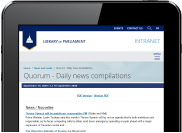 190
190
editions of Quorum, a daily collection of top Canadian news stories
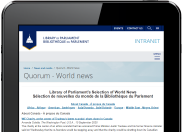 150
150
editions of Quorum – World News, a compilation of international news stories
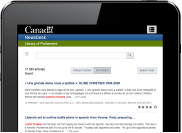 2,579
2,579
personalized notifications for NewsDesk, a media monitoring tool that had close to 1.3 million page views
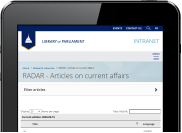 24
24
editions of Radar, a compendium of reports, articles and other documents on issues of interest to parliamentarians that generated 4,670 article requests (not published in October and November 2019 because of the general election)
Our Library Catalogue, which makes the entire Library collection searchable, is available online. We are continually improving the data and usability of this key tool for our users through data cleanup projects and profiling special collections.
“Databases A–Z” is a popular tool with clients who are looking to access the Library’s electronic subscription databases. In 2019–2020, clients used the tool more than 10,000 times to find the most relevant resources for their work.
Subject guides help parliamentarians and their staff use Library tools like the catalogue and our databases effectively. The guides direct users to reliable and authoritative resources on specific topics that enable them to initiate their own research.
Our subject guides were consulted 3,984 times in 2019–2020. This is a reduction in the number of views compared to the previous year, which can likely be attributed to the general election. The Library plans to update and improve the guides in 2020–2021.
The Library has seen a steady trend over several years where users rely more heavily on digital sources of news. In 2019–2020, clients used the Library’s popular newspaper and magazine app to read more than 304,000 articles. This was a 28% increase over 2018–2019 (a fiscal year that saw a 39% increase over the previous fiscal year). The app gives users access to more than 6,400 titles.

Our media monitoring tool and other news websites and blogs to which the Library provides access generated a total of more than 1.5 million page views:
The Library’s Collections Advisory Committee works closely with front-line librarians and analysts to grow our collections in ways that support our clients’ needs.
In 2019–2020, the Library placed a particular focus on developing our sources of online news, broadcast media and transcripts. These resources are those that parliamentarians use most often. We reviewed our subscriptions to print publications and periodicals, shifting where possible to more cost‑effective electronic formats while ensuring the same level of information remained available to users. One area of expansion was to our sources of international news.
The Library made 8,526 new items searchable for users through the catalogue. We also completed 1,238 classification requests using our custom subject taxonomy, which makes the Library’s own publications easier to search for and find on our website.

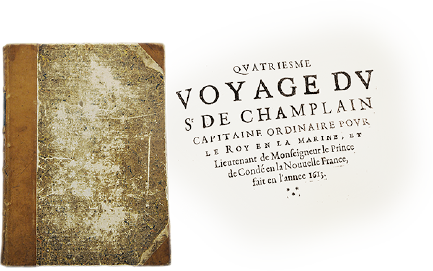
With the closure of Centre Block, the Library’s Preservation Lab moved our collection of rare books, art and artefacts to a facility specially equipped for storing and preserving these special collections. We planned and executed the move with utmost care to ensure our valuable assets were not damaged in any way.
The Preservation Lab took on a number of other special projects during the past fiscal year. The team bound 1,332 books and restored 260, and took on 38 projects for clients, including the Speakers of the Senate and House of Commons. One project was a collaboration with Veterans Affairs Canada on the preservation of the Books of Remembrance in the new Room of Remembrance.
When the Main Library closed in 2018–2019 for the decade-long rehabilitation of Centre Block, we opened four new or refurbished locations across the Parliamentary Precinct: at 125 Sparks St. (which currently serves as our Interim Main Library), in the Senate of Canada Building, in West Block and in the Confederation Building. Including our branch at 180 Wellington St., which opened in July 2017, we now serve clients at five locations.
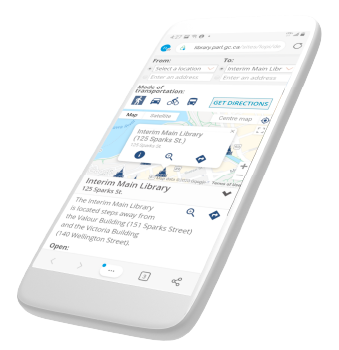
We actively promoted the branches during an open house in May 2019 and through a number of special exhibits. We developed new metrics to enable Library branches to record and analyze usage data about the Library. And we created an interactive map – which received nearly 900 page views – to help Library users find our branches whether they are walking, cycling or driving.


The Library planned a series of five pop‑up events in East Block and the Wellington Building to promote our services and new locations. Pop‑up events facilitate direct contact with our clients so that we can hear their ideas and feedback, and use what we hear to improve our services. Closures resulting from the COVID‑19 pandemic meant just two pop‑up events were held. These generated more than 90 interactions with parliamentarians, their staff and others, allowing us to share information and learn more about our clients’ needs.
The Library offers high‑quality learning opportunities for parliamentarians and their staff on public policy, legislation and other topics of interest. We also provide in‑person and online training to help parliamentarians use our services and to inform them about the many resources we provide.
In 2019–2020, we kept a strong focus on recruiting high‑profile guests for our seminars and sustained our relationships with forward‑thinking professional development providers. Our seminars were well attended, with a 13% increase in attendees over five years. Average seminar attendance in 2019–2020 was 50 participants, a 2% increase compared to the previous fiscal year.
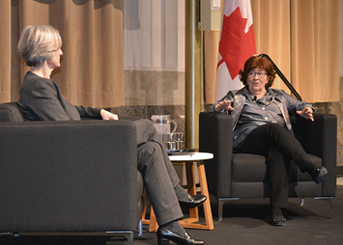
The Parliamentary Librarian hosted the Honourable Louise Arbour, current United Nations Special Representative of the Secretary‑General for International Migration, for a conversation about the role of the international community and multilateral institutions in addressing international migration. They also talked about Canada’s role on the world stage as a senior member of several multilateral institutions and international bodies.
As part of the Library’s orientation program for the 43rd Parliament, we offered a series of seminars designed to meet the immediate needs of parliamentarians. We welcomed large audiences of new parliamentary staff during recurring seminars on such topics as the parliamentary financial cycle, speech-writing fundamentals and social media best practices – including how to protect yourself from misinformation and disinformation.
These regularly programmed information sessions are designed to raise awareness of the best ways to access and use Library resources and services. They also enable us to gather feedback from our clients about the information they need and how well they understand and use Library resources.
In 2019–2020, we delivered 36 sessions: 18 in English and 18 in French.
We ran fewer sessions than the previous year due to the COVID‑19 lockdown. However, attendance at each session increased by roughly 20% over 2018–2019. More than 75% of attendees were Senate or House of Commons staff. The sessions received overwhelmingly positive feedback from attendees, with 93% of respondents saying they would use the information they learned.

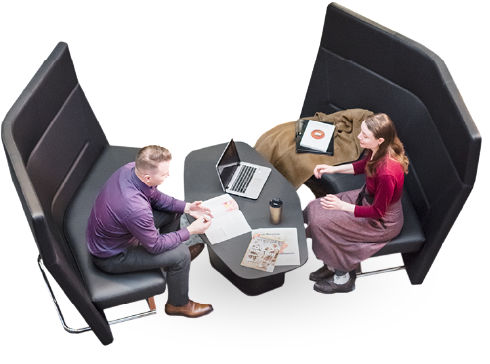
The Library conducted 102 technical briefing sessions, which helped train parliamentarians and their staff on how to get the most out of the Library’s resources and services. We reached more than 700 individuals during 47 one‑on‑one sessions, 41 sessions for small groups and 14 sessions for larger groups.
Most sessions involved in‑person visits and training since many of our clients prefer direct contact with Library staff. The most popular sessions focused on Library products and services in specific subject areas.
The Library’s information service answers general questions about the Parliament of Canada. In 2019–2020, our staff responded to more than 22,000 queries from the public about Parliament’s role, history and work. We also gave people access to such documents as Sessional Papers and helped them find the parliamentary offices and resources they were looking for.
When digital versions of documents are available, they are easier for parliamentarians and the public to find. This fiscal year, the Library delivered a major digitization project of historical parliamentary publications, which added key collections of digitized content to the Library’s online portal.
The Library has made Welcome to Parliament ![]() (2.49 MB, 9 pages), the brochure that provides an overview of Canada’s parliamentary system, available in more than 50 languages, including 13 Indigenous languages and dialects. It is available in an accessible PDF format.
(2.49 MB, 9 pages), the brochure that provides an overview of Canada’s parliamentary system, available in more than 50 languages, including 13 Indigenous languages and dialects. It is available in an accessible PDF format.

The Library is always working to enlarge its collection of historical resources related to Parliament. In 2019–2020, we increased the online availability of this historical information through enhancements to two databases: Canadian Parliamentary Historical Resources and Parlinfo.
We collaborate with the Canadian Research Knowledge Network to give our clients easy access to the Canadian Parliamentary Historical Resources portal. The portal provides full‑text searchable parliamentary publications of the Senate and the House of Commons in both official languages, going back to 1867. We digitized more than 900,000 pages during this fiscal year as part of our long‑term effort to deliver digital versions of parliamentary publications on this platform. The pages are now consolidated in the portal, bringing its total to more than 5.4 million pages of historical content. All of this information is available online, for free. We also improved the look, feel and usability of the portal’s design and navigation.
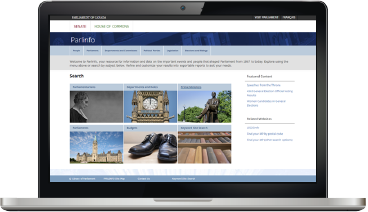
Parlinfo continues to provide historical information representative of the people and events that have made up Canada’s Parliament from 1867 to today. In 2019–2020, we added new pages and data to Parlinfo, including information about the 43rd Parliament and the new cohort of parliamentarians, and a new page for parliamentary committee information. We also made other improvements to the database.
Thanks to the recent redesign of Parlinfo, we were able to deliver critical election-related data quickly, accurately and efficiently.
The Library welcomes visitors to Parliament and provides information that enables Canadians to learn about and connect with the institution. Our outreach program provides visitor services, educational resources, retail products, web products, publications and innovative digital resources for Canadians of all ages.
The Library marked the beginning of 2019–2020 with guided tours of the two new locations of the Senate and House of Commons following the closure of Centre Block. The Library conducted a national promotional campaign to let the public know about these important changes.
Client feedback was sought to ensure that all visitor services met the Library’s exacting standards of service to Canadians. We learned that the public generally considers our tours of the Senate of Canada Building and West Block to be high‑quality, accessible experiences. We also launched a redesigned website and recruitment tools that help us find and hire the best possible parliamentary guides.
Senate of Canada Building and West Block tours: The Library welcomed more than 289,000 visitors to the Senate of Canada Building and West Block, where the House of Commons now sits. Visitors included more than 10,500 students and teachers who discovered the people, history, functions, art and architecture of Parliament.
East Block tours: From July to September 2019, nearly 14,300 visitors explored four heritage rooms restored to their appearance in 1872.
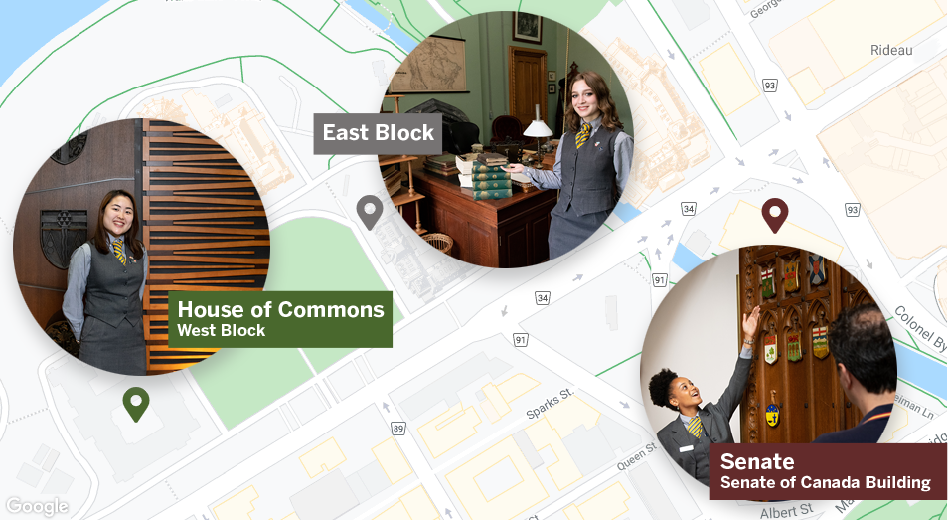

More than 200 young Canadians applied for the Library’s Parliamentary Guide summer program in 2019. The program offers bilingual students a chance to work at the centre of Canadian democracy and helps them improve their public‑speaking and second‑language skills. The Library hired 69 university students from nine provinces to give tours of the Senate of Canada Building, West Block and East Block.
Seventy‑three university students from the National Capital Region led guided tours of the Senate of Canada Building and West Block during the fall and winter of the 2019–2020 season.
In 2019–2020, we continued the Library of Parliament Internship Program – a popular program that relaunched in 2018. The year‑long program, which is open to candidates from across Canada, provides paid internships to five university graduates. Interns gain experience in the policy and legislative process, the development of Library products and services for parliamentarians, or in public education programming about Parliament.
Over the years, the Library has benefitted greatly from the internship program as many interns have gone on to careers with the Library as analysts, research assistants or librarians.
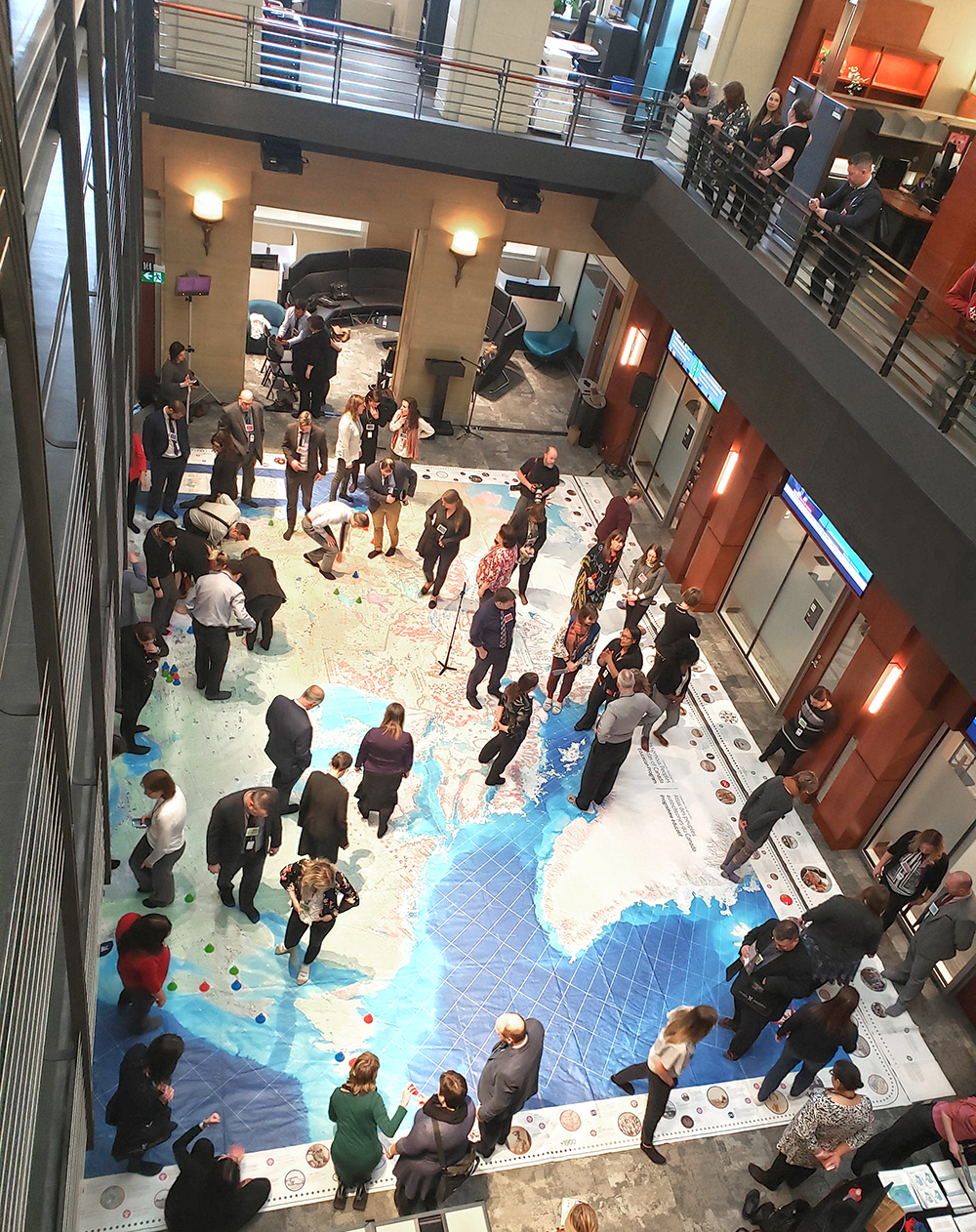
The Teachers Institute on Canadian Parliamentary Democracy gives 85 teachers from across Canada an inside view of how Parliament works. It is a once‑in‑a‑lifetime professional development opportunity that gives teachers added tools and peer‑tested strategies they can bring back to their classrooms.
The 23rd edition of the Institute welcomed several new initiatives. A new group activity offered educators valuable insight on how to incorporate Indigenous perspectives into their teaching. Luncheon roundtables gave participants an intimate engagement opportunity with senators. Finally, an audience with the Honourable Madam Justice Suzanne Côté of the Supreme Court of Canada helped put a human face to this important institution.
This was the first edition of the program held in the new Senate of Canada Building and West Block. Participants were in awe of the new parliamentary spaces, including the Interim Main Library.
Each week throughout the school year, the Library’s public information service hosts a small group of students from Ottawa’s Ridgemont High School’s Developmental Disabilities Program. Volunteer students with special needs get practical work experience by assembling kits of outreach publications about Parliament that parliamentarians then send out to their constituents. Sometimes working alone and sometimes in small teams, the students provide a service to the community while they learn valuable skills.
Although the program was suspended in March 2020 because of the COVID‑19 pandemic, volunteer students nonetheless prepared 500 kits in 2019–2020.
In June 2019, the Library opened the Interim Main Library at 125 Sparks St. to the public as part of the Doors Open Ottawa 2019 weekend. Over the two days, we welcomed 1,286 visitors.


Parliament’s eighth Poet Laureate, Georgette LeBlanc, had another productive year, completing a recording that included original songs and a reading of excerpts from her book Le Grand Feu. Ms. LeBlanc also concluded her Poem of the Month program. Finally, work started on Ms. LeBlanc’s entry into Poets Row. This visual commemoration of every previous Parliamentary Poet Laureate is located in the Interim Main Library at 125 Sparks St. and includes excerpts of their poetry.
The Library supported Ms. LeBlanc in 2019–2020 by providing advice and assisting her as she completed her mandate.
The Library’s social media accounts continued to show gains in 2019–2020 in both followers and engagement.
Two of our Twitter accounts, @LoPInformation and @BdPInformation, provide facts about the important events and people that have shaped the Parliament of Canada since 1867. These accounts grew by 252 followers in 2019–2020, for a total of 2,314 followers.

The Library’s other two Twitter accounts, @LoPResearch and @BdPRecherche, help parliamentarians and their staff stay connected with the Library’s research. In 2019–2020, we gained 291 followers on these two research accounts, bringing the total to 3,134.
The Library’s bilingual Instagram account now has more than 1,300 followers. Our LinkedIn account – with more than 1,830 followers – is used primarily to find new talent. We also use it to promote the research publications most relevant to the people in our professional networks.
The Parliament of Canada’s social media accounts – which the Library manages – continued to increase their reach. The @PARLyouth and @PARLjeunes Facebook pages gained 13,000 new followers, for a total of 59,000, while Parliament’s YouTube channels – PARLyouth and PARLjeunes – had 229,000 views. The latter gain was partly due to two high-definition video tours of the Senate of Canada Building and West Block that we posted to YouTube to enable people who cannot visit Parliament in person to tour the buildings.
To provide the most reliable and relevant services to parliamentarians and the public, Library employees need strong support and sound governance from the organization. Our corporate services team delivers this support through its extraordinary efforts in human resources, finance, information technology, publishing and creative services, facilities management, and much more.
In 2019–2020, our corporate services team wrapped up its activities on a renewal initiative that we launched in 2017 to enable us to better respond to the needs of internal clients. This renewal exercise, which concluded by focusing on the Library’s strategic planning processes, allowed the organization to:
In parallel, the Library reviewed its services to Officers of Parliament to ensure they were provided in a more consistent manner. This solidifies the Library’s role as a centre of expertise for information and reference services and as a trusted partner for Parliament.
To be Parliament’s preferred and trusted source of information and knowledge.
The Library of Parliament contributes to Canadian parliamentary democracy by creating, managing and delivering authoritative, reliable and relevant information and knowledge for Parliament.
An informed and accessible Parliament.

THE SPEAKER OF THE SENATE AND
THE SPEAKER OF HOUSE OF COMMONS
STANDING JOINT COMMITTEE ON THE
LIBRARY OF PARLIAMENT
PARLIAMENTARY
LIBRARIAN
SERVICE AREAS
Parliamentary Information and
Research Service
Information and
Document Resource Service
Business Support Services
The Speaker of the Senate and the Speaker of the House of Commons: Vested with the direction and control of the Library of Parliament in accordance with the Parliament of Canada Act.
Standing Joint Committee on the Library of Parliament: Composed of senators and of members of the House of Commons, it is responsible for assisting the Speakers on the operations of the Library.
Parliamentary Librarian: Exercises control and management of the Library and has the status of a Deputy Head, reporting to the two Speakers.
Parliamentary Information and Research Service: Provides parliamentarians with news, reference, and research and analysis services. It also oversees the Library’s public education programs and seminars for parliamentarians and their staff.
Information and Document Resource Service: Builds, manages, preserves and optimizes access to the Library’s resources and collections; compiles and disseminates historical information about Parliament and parliamentarians. This service area is also the steward for the Parliamentary Poet Laureate.
Business Support Services: Provides a full range of corporate services to the Library, including human resources, finance, information technology, publishing, editing and creative services, materiel management, learning, security, facilities management, administrative services and corporate planning.
The Library of Parliament has five key responsibilities:

Dr. Heather Lank
Parliamentary Librarian

Sonia Bebbington
Director General,
Information and Document Resource Service

Marcus Pistor
Director General,
Parliamentary
Information and Research Service

JoAnne St‑Gelais
Director General,
Business Support Services
| Service | Main Estimates ($) |
Supplementary Estimates and Adjustments ($) |
Total Authorities ($) |
Actual Spending ($) |
|---|---|---|---|---|
| Parliamentary Information and Research Service | ||||
| Research and analysis | 11,980,624 | 70,692 | 12,051,316 | 11,973,858 |
| Reference services | 5,627,894 | 76,229 | 5,704,123 | 5,967,514 |
| Public education programs1 | 5,874,492 | 187,436 | 6,061,928 | 4,589,670 |
| Information and Document Resource Service | 8,284,350 | 72,051 | 8,356,401 | 8,636,438 |
| Business Support Services2 | 11,596,437 | 550,751 | 12,147,188 | 11,830,143 |
| Office of the Parliamentary Librarian3 | 1,343,290 | 38,749 | 1,382,039 | 1,230,253 |
| Employee Benefit Plan | 5,244,929 | (193,661) | 5,051,268 | 5,051,268 |
| Total | 49,952,016 | 802,247 | 50,754,263 | 49,279,144 |
| FTEs4 | 378 | n/a | 378 | 362.56 |
View the audited financial statements ![]() (418 KB, 24 pages) [Accessible version of financial statements
(418 KB, 24 pages) [Accessible version of financial statements ![]() (340 KB, 22 pages)]
(340 KB, 22 pages)]